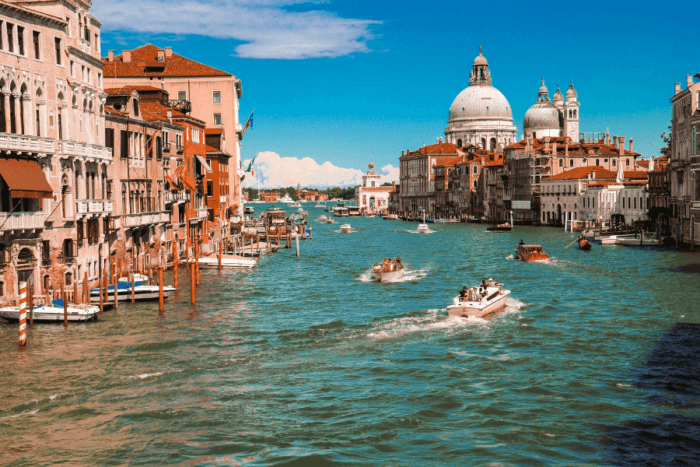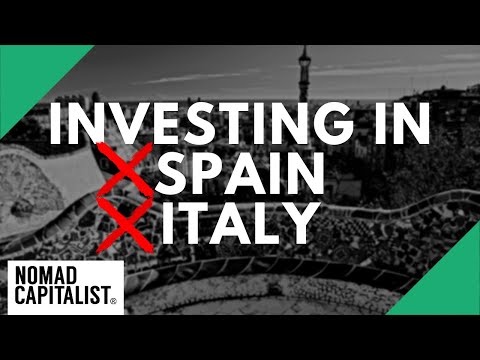Why We Don’t Suggest Buying Cheap Real Estate in Italy or Spain
November 28, 2024
Let’s talk about cheap real estate.
Whenever we talk about ultra-cheap properties in countries like Georgia, Cambodia, Armenia or Egypt, people often ask why they shouldn’t just buy properties for the same cost in countries like Italy or Spain instead.
After all, those countries are more developed, and don’t they offer dirt-cheap real estate to foreigners eager to enter the market?
Italy’s famous one-euro house scheme and Spain’s attractively priced rural properties have garnered global attention, promising a slice of European charm for a bargain.
However, at Nomad Capitalist, we believe in looking beyond the allure of low-price tags to assess the true value of an investment – especially real estate.
While the idea of owning a piece of picturesque Italian countryside or a quaint Spanish village may seem like a dream come true, these opportunities often come with hidden challenges. From ridiculous renovation costs to bureaucratic hurdles and uncertain market conditions, the reality can quickly overshadow the initial appeal.
When looking to invest in real estate, you may find that there’s a lot more to consider than you thought. You’ve also got to consider property values, return on investments, economic growth and government deductions.
While assessing different geographical areas and comparing emerging markets to the real estate markets in countries like Spain and Italy, we’ve found that it’s a safer and smarter decision to invest in properties in countries with emerging economies.
After all, at Nomad Capitalist, our mantra is to ‘go where you’re treated best’, not just where the price is right. Investing wisely means choosing assets that enhance your portfolio and lifestyle, rather than being lured by misleadingly low costs.
So, here’s why you should invest in properties in emerging frontier markets rather than purchasing real estate in Italy, Spain and similar countries.

Cheap European Real Estate: Apples to Apples Comparison
People have asked us, ‘Why should I buy property in Tbilisi, Georgia for a thousand dollars per meter? Why shouldn’t I buy cheap real estate in Italy or Spain, where you can find properties for the same price?’
Great questions.
This is where you have to make apples-to-apples comparisons.
Let’s say you’re looking to buy property in the centre of Tbilisi or Bogotá or next to the royal palace in Phnom Penh, Cambodia.
Regardless of the price, none of those investments are the same as buying a property located a four-kilometre walk away from the city centre in a second or third-tier city in Italy or Spain.
Even if that property is also a thousand dollars per metre, that’s not really an entirely fair comparison.
To make a fair apples-with-apples comparison, you need to remove the brand name from the product. In this instance, we will consider Western Europe as a ‘brand’.
These well-known countries come with a brand and a preconceived value already attached to them. In this case, think of Spain or Italy as a brand.
A lot of people love the idea of moving to Spain or Italy. They love the romantic idea attached to these countries. They’ve bought into the country’s brand.
To make a better investment decision, remove the brand that’s influencing your perception of the country and the risk involved with investing there.
Then, look at the fundamentals of the countries, Spain versus Georgia or Italy versus Armenia, and you’ll get a different perception. Compare the taxes and regulations in each country. Consider the potential for growth and returns.
Look at all this without the brand attached.
With this in mind, let’s look into the four main reasons why we don’t advise buying cheap properties in countries like Spain or Italy.
Reasons We Don’t Recommend Buying Cheap Real Estate in Italy or Spain
1. Property Value
While you may find cheap property in a decent location, the properties are often substandard.
Nomad Capitalist founder, Andrew Henderson, has experienced this personally, commenting at one point: ‘Someone once showed me some cheap real estate in Italy. As I was looking at the property, I found that there were some issues that people typically complain about when they look for properties in markets like Tbilisi or Phnom Penh. But this person wasn’t worried about the same issues with a property in Italy.’
Why?
Recently, we had a real estate master class in Tbilisi, where people came and looked at properties. Some of the things we heard during that class were the same concerns we’ve heard over the years from people looking at property in emerging markets.
They worry about how the stairs look, that the railing looks a bit shaky or that the patio needs to be renovated.
In other words, they can see that it’s not up to standard.
These properties in Western Europe have the same issues – you can see it just by looking at the pictures: these buildings don’t look like they’re in marvellous condition; these apartments are not in pristine shape; they all need work.
This is important to note for foreigners when buying real estate.
The challenges that people often have when they look at property in emerging economies and city centres are mirrored in these countries as well. They shouldn’t be ignored just because the property is in Italy or Spain.
2. Lower Returns, More Regulations
The second reason we don’t advise investing in real estate in Italy or Spain is that, generally, you will have lower returns and more regulation regarding your returns in these countries.
For various reasons, most Western European countries have worse returns on property. This could be due to all the bureaucracy, regulation, and other people from other countries coming in and buying real estate or making lifestyle purchases.
Because of this, prices go up and yields go down. In a lot of emerging or frontier economies where there is less outside demand driving up prices, you can make 8% to 11% in returns, sometimes more.
You’re not going to make that in Spain.
Part of the reason is because many of these countries are going to restrict how you can use the property. For example, tourist rental laws in Spain put restrictions on whether you can use the property as an Airbnb or not.
So, you may not be able to make returns renting it out that way.
Another possible issue is rent control. Prices could be depressed due to the property owner’s not being allowed to charge a fair market rent or raise the rent if necessary.
These markets often have very pro-tenant rules, where someone can just stay there and squat and it’s very hard to get them out – it can take months or years in some cases.
So, how do you make a return if your tenant isn’t paying you?
3. Is the Economy Growing?
The third reason you don’t want to invest in real estate in Italy or Spain is because of the low growth potential in these areas.
Is Italy’s economy growing? Barely, and other countries are overtaking Italy in global economic rankings.
We believe that for a lot of countries in Western Europe, their best days are behind them. The prospect of growth is less likely.
The challenge we see in countries like Spain or Italy is that they are beyond their glory days. They’re cheap for a reason and it’s not because the countries are growing.
Right now, there is a continual movement of people to bigger cities. In second and third-tier cities, if there’s not something unique that keeps people there, they might be clearing out and going to bigger cities.
Some cities like Madrid, Rome or Milan, for instance, still have possible growth opportunities. But a city near Naples or in the south of Spain, where you’re going to find lower real estate prices, has fewer growth opportunities, as evidenced by the unemployment rates there, especially for youth in those countries.
Even in the United States, there are few opportunities for people in their 20s to buy properties at the prices that their parents were. And a lot of Western countries have the same issue.
On the other hand, you go to the emerging economies and the younger generations are going to become much wealthier than their parents.
Their economies are growing, and their governments are pushing that growth.
When considering where to put your investment dollars, you want them in the places where there is the most potential for growth, and that’s just not the case with the cheap real estate in Italy and Spain.
4. Government Deductions
The fourth reason looks at how the government impacts your investment. Even if you can manage to get past the three reasons discussed above and make money off your real estate in Italy or Spain, you are still going to have to pay high taxes on the money you make.
Plus, the Italian or Spanish government will take a portion of the money you make as they impose different fees on you. Remember, there are ways to minimise real estate taxes.
For example, Mr Henderson had two rental properties in the United States. When he sold the properties, he was looking at the sheet of deductions and it was insane. There were so many deductions for various things. An incredible amount of fees.
Comparatively, if you were to sell a property in these emerging economies we’ve discussed, where we generally advise investing, the deductions are significantly less. Rather than a lengthy list of deductions and fees, they take out a small fee and you could keep the rest.
It’s a big difference.
Where Should You Buy Cheap Real Estate?
So, if you shouldn’t buy cheap real estate in Spain or Italy, where should you be looking for cheap property investment opportunities?
We could give a masterclass on just that. It is actually included as part of some of our services for those interested in expanding their portfolio to include lifestyle real estate abroad (more on that in just a bit, though).
For now, our advice is simple: when considering alternatives to cheap real estate in Italy or Spain, explore locations that offer not only affordable property prices but also significant investment potential.
Here are four promising regions where cheap real estate could be a more strategic, lucrative move.
Tbilisi, Georgia

Tbilisi is increasingly recognised as a burgeoning real estate market, offering properties at competitive prices with substantial growth potential.
This is an especially great choice to start looking at if you actually want to live in the property you purchase. Residents of the city benefit from a low cost of living, favourable tax conditions and a rapidly growing economy.
Georgia’s strategic location at the crossroads of Europe and Asia makes it a compelling choice for investors seeking high returns in a developing urban landscape.
Phnom Penh, Cambodia
With its youthful and somewhat dynamic economy, Phnom Penh is one of Asia’s most interesting estate markets.
The city is witnessing rapid urbanisation and development, supported by a government keen on economic expansion. Investors can find affordable properties with promising rental yields, coupled with a relatively lax regulatory environment that encourages foreign investment.
Bucharest, Romania
As one of Eastern Europe’s hidden gems (and there aren’t many left, to be honest, at least not to foreign investors or wealthy expatriates), Bucharest offers both cultural richness and economic promise.
The city’s real estate market is still in its growth phase, with property values gradually rising as infrastructure and business opportunities expand.
Lima, Peru
For those looking beyond Europe, Lima is one of the booming capitals of South America.
While the city itself is young and on the rise, there are plenty of cheap properties in Lima that far exceed what you might find in Spain or Italy – in terms of quality and potential yields.
Overall, Lima’s diverse economy and relatively low property prices provide a fertile ground for investors aiming to capitalise on the city’s ongoing modernisation and economic development.
Belgrade, Serbia
Like Bucharest, Belgrade is somewhat up and coming. It has a lot of potential, with property prices significantly lower than in Western Europe. It’s also not hard to live like a king in Belgrade.
The Serbian government is actively fostering a business-friendly environment with initiatives to attract foreign investment. Overall, Belgrade’s expanding infrastructure makes it a promising location for cheap real estate with potential for appreciation.
Cheap Real Estate in Italy or Spain: FAQs
Certain areas of Italy, especially in rural regions and small villages, have seen population decline over the years. This has led to an oversupply of housing and decreased demand, resulting in cheap Italian real estate.
Rural areas of Italy and Portugal, less touristy regions of Spain and Greece and some Eastern European countries, such as Bulgaria and Romania, are often the best places to buy cheap real estate.
Cities like Porto in Portugal, Valencia in Spain, and Budapest in Hungary are known for offering more affordable housing options than other Western European cities. In Asia, countries like Thailand, Vietnam and the Philippines also offer cheaper real estate.
Italy and Spain offer cheap real estate options, but the cost can vary significantly depending on the region, city and property type. Generally, both countries’ rural areas and smaller towns tend to have lower prices than major cities and tourist hotspots.
Some of the cheapest real estate options in Spain can be found in regions like Extremadura, parts of Andalusia, Castilla-La Mancha and certain areas in Galicia and Murcia. These regions often offer affordable prices compared to the popular coastal and urban areas.
Although Tuscany is famous for its popularity among tourists, more affordable properties can be found in less-famous towns and rural areas, away from the main tourist attractions.
Lifestyle Real Estate in Italy and Spain
The considerations for making a purchase with the expectations of returns are different from considerations for making a lifestyle purchase.
No doubt, there are some Western European countries that have never fully come out of recession where you could find some great property deals. We have people who use our services who simply want to live in Spain.
If you want to live in Valencia, Spain or wherever else, that’s a lifestyle purchase you could consider.
A lifestyle purchase is not really an investment, and there’s nothing wrong with that if that’s what you want to do. If you want to live in Barcelona, Valencia, or wherever, go right ahead.
If you are drawn to the Italian or Spanish lifestyle and are interested in a Golden Visa in one of these countries, you may want to act now. Europe’s golden visa programs are rapidly disappearing and changing.
The Spanish Government is planning to put an end to its residence-by-investment program at the start of 2025. While Portugal has abolished the real estate investment route for its residence program.
A lifestyle investment is more about your enjoyment rather than your financial returns. You don’t need to have an optimal return on every single dollar you put out into the marketplace. Investing in yourself and your quality of life is a very important investment.
But on an apples-to-apples basis, you want growth, and you want potential. Don’t live in the past or assume that the brand name on real estate in Italy or Spain means that you are making a good investment.
Don’t look at the brand name. Instead, consider these four things to know where to invest in real estate for the best returns and greatest growth.
That’s where Nomad Capitalist comes in – we ensure you’re fully informed about all your options so you can make the best decisions for your future.
We help seven- and eight-figure entrepreneurs and investors create a bespoke strategy using our uniquely successful methods.
You’ll keep more of your own money, create new wealth faster and be protected from whatever happens in just three steps. Discover how we do things here.


Is Land Investment Safer?
When American humorist and writer Mark Twain said, ’Buy land, they’re not making it anymore,’ he was definitely on to something. Land is finite, and that scarcity gives it lasting appeal. Yet, despite its obvious logic, land remains one of the most misunderstood investments. Many people are put off by its perceived complexity, potential legal […]
Read more

Top Emerging Market Economies for US Investors in 2025
If you’re still parking all your capital in overvalued US real estate or clinging to tech stocks in the S&P 500, you’re playing an old game while rivals are redesigning the board. The world has move on. Smart investors know that the biggest returns aren’t coming from Wall Street anymore – they’re coming from below-the-radar […]
Read more

Capital Gains Tax on Real Estate in the United States
For most people, buying a home is the single largest financial commitment they’ll ever make – and often, one of the most stressful. Yet, for many US citizens, home ownership remains a cornerstone of the American Dream. Whether it’s about financial security, independence or building generational wealth, millions strive to get on the first rung […]
Read more





